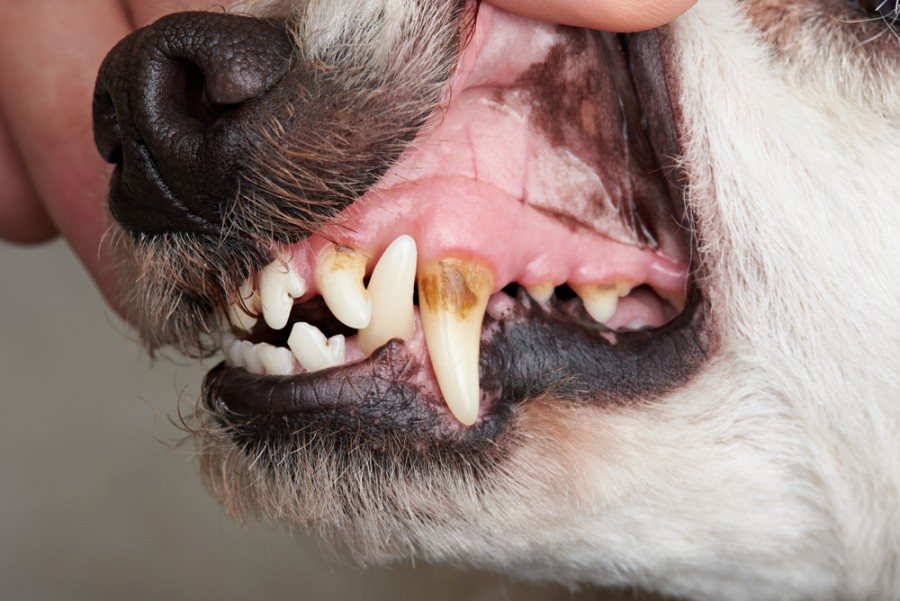There are certain foods that you already know are fantastic for dogs, like fish, chicken, carrots, and broccoli. But did you know that coconut oil is also wonderful for your furry little friend?
It’s true: Coconut oil has wide-ranging health benefits for dogs. If you’re not already working some into your pup’s diet, it may be time to start — but only if you want your mutt to experience the benefits listed below.
First, though, let’s take a look at why coconut oil is so good for our pups.
What Makes Coconut Oil So Good for Dogs?
Coconut oil is full of medium-chain triglycerides (MCTs). MCTs are fatty acids that are quickly absorbed into the bloodstream, making them a fantastic energy source for both the dog’s body and brain.
Many diseases choke off the body’s ability to process glucose, which then limits the amount of energy that your dog’s body gets from food. MCTs offer an alternative source of energy, which helps the body sidestep many of the symptoms that those diseases cause.
Besides coconut oil, other foods that are high in MCTs include cheese, milk, and yogurt. However, coconut oil has more than twice as many MCTs as those foods, and it’s one of the few food options that’s both rich in MCTs and dairy-free.
Now that we know the reason that coconut oil is so healthy for dogs, let’s see the actual effects of adding it to your pooch’s diet.
Top 8 Health Benefits of Coconut Oil For Dogs:
1. Coconut Oil Can Help Dogs Lose Weight
If your pup is looking a little flabby around the midsection, adding a little coconut oil into their food may help them get back into shape.
However, it’s not that simple. Coconut oil is high in fat and cholesterol, so you can’t just mix some in with their kibble and expect miracles.

Instead, you need to supplement the coconut oil with L-carnitine, lipoic acid, lysine, leucine, and fiber. Doing so can improve their metabolism, helping them to drop weight and improve their body condition. That doesn’t mean you shouldn’t increase their exercise levels, but boosting their metabolism will go a long way toward providing you with quicker results.
2. Coconut Oil Can Help With a Variety of Skin Issues
If your dog suffers from conditions like eczema, dry skin, dermatitis, or bug bites, coconut oil can help clear them up. Simply rub a little bit of oil on the affected patches of skin once or twice a day until they’re healed.
Try to keep your dog from licking the coconut oil off, as you want it to be absorbed into the skin. However, it’s not the end of the world if your pup eats it, as it can have antimicrobial properties when taken orally.
You should still consult a vet if your dog has skin problems, but for persistent issues, a little bit of coconut oil may be all it takes to provide relief.

3. Coconut Oil Can Boost Brain Function
As mentioned above, the MCTs in coconut oil provide an excellent energy source for the brain. This can help reduce cognitive decline and decrease the effects of diseases like dementia.
It’s currently thought that poor glucose metabolism may be a factor in conditions like Alzheimer’s disease. By giving your dog’s brain another energy source — especially one that’s so easy to utilize — it can stave off the effects of dementia.
It’s important to note, however, that coconut oil is best used for preventing cognitive issues. It may not be as useful for treating existing problems.
4. Coconut Oil May Be Able to Treat Epilepsy
Epilepsy is a problem that affects a wide range of dogs, and the most common treatment is anti-seizure medication. However, those meds are only effective for 60-70% of animals.
Many anti-seizure medications also trigger serious side effects, which can make it undesirable to continue treatment.
Recent studies have shown, however, that coconut oil can be as effective at reducing both the number of seizures and the likelihood of side effects. It’s not quite a cure, but it’s at least a step in the right direction.
We’re not suggesting that you stop giving your dog their anti-seizure meds; it’s worth mixing some coconut oil into their food as an added precaution, though.

5. Coconut Oil May Keep Biting Bugs at Bay
There’s a ton of anecdotal evidence suggesting that coconut oil can keep fleas and ticks from feasting on your dog. To date, there’s only been one study that we know of testing this hypothesis, but the results were promising.
There’s an ingredient in coconut oil called lauric acid, and it can serve as a flea and tick repellant. It’s not known exactly how it works, but one popular theory is that it suffocates the little biters.
We wouldn’t recommend throwing away your commercial flea and tick killer just yet or getting rid of your flea bombs. But, if you want to give your dog a little extra protection, a light coating of coconut oil can’t hurt.

6. Coconut Oil Can Help With Intestinal Parasites
Your dog will convert the lauric acid in coconut oil into something called monolaurin. Monolaurin can kill giardia, tapeworms, and other intestinal parasites.
How does it work? After being consumed by the parasites, the monolaurin will break down the walls of their cells, killing them.
Even better, it does so without harming any of the beneficial bacteria living in your dog’s digestive tract. This allows you to treat your pet’s intestinal issues without adding more stress to their system.
For best results, combine the coconut oil with a laxative to flush all the dead critters out of your pup’s intestines.
7. Coconut Oil Makes a Great Toothpaste
It’s extremely important to take good care of your dog’s teeth, and coconut oil is one of the best natural toothpastes around. It’s naturally antimicrobial, so it can help kill the organisms responsible for tooth decay.
There are various recipes for coconut oil toothpaste floating around, but if you want to keep things basic, all you need is a soft-bristled toothbrush and a tub of coconut oil. You can also coat a bone or other teeth-cleaning toy with oil and let your dog do the hard work themselves.
You may want to have your dog’s teeth professionally cleaned before you start on this new dental regimen, though.
As a bonus, the coconut oil may just clear up their doggy breath as well (we hope you love the smell of coconuts).

8. Coconut Oil Is Great for Treating Small Wounds and Cuts
Again, coconut oil is antimicrobial, so it’s a great way to keep small wounds clean. You can just rub a little bit on the affected area and let nature take over.
Unlike many other topical disinfectants, coconut oil is completely safe for dogs to eat, so you don’t have to worry if your pooch licks it off. Of course, you may need to monitor them to prevent that from happening so the coconut oil can work its magic. It’s probably wise to put a bandage or cloth over the wound, just to be safe.
We wouldn’t advise treating major injuries with coconut oil, but for small owies, it’s a wonderful alternative to antibiotic ointments.
Coconut Oil May Have Other Uses, But the Science Just Isn’t Clear Yet
If you research coconut oil for dogs on the internet, you’ll find all sorts of outlandish promises. Many people treat the stuff like it’s the fountain of youth.
Here are just a few of the other health claims we’ve seen made about coconut oil:
- It improves digestion.
- It helps control diabetes.
- It stops coughing.
- It turbocharges the immune system.
- It promotes healthy thyroid function.
- It increases energy.
- It reduces chronic inflammation.
Now, are we saying that coconut oil definitely won’t do any of these things? No, but we are saying that the science isn’t there yet.
If you start giving your pup coconut oil, you may notice some or all of these benefits — or even others not listed here. While that’s great, it’s not enough for us to make any sweeping claims.
Are There Any Disadvantages to Feeding Your Dog Coconut Oil?
You might think coconut oil is the perfect food. The fact is that there can be disadvantages to using it as well.
One of the big ones is that it’s extremely high in saturated fat. If you don’t follow the proper weight loss regimen outlined above, it’s possible for your dog to pack on the pounds by eating this stuff. Be sure to monitor any changes to their weight, and it’s probably a good idea to get their cholesterol checked regularly too.
There’s also evidence that saturated fat can cause inflammation, which leads to conditions like leaky gut.
Now, it should be noted that there haven’t been any studies that have indicated that coconut oil causes inflammation or leaky gut; this allegation is merely a few people connecting a few dots. However, it’s something to keep your eye on.
Finally, it looks like ingesting coconut oil can affect your dog’s sense of smell. The belief is that those pesky saturated fats interfere with the canine olfactory system. This shouldn’t be an issue unless you have a working dog, but it’s worth noting all the same.

How Much Coconut Oil Should I Feed My Dog?
There isn’t a broad consensus on the “right” amount to give your mutt, as most of the studies use varying amounts.
Generally speaking, though, most experts recommend giving small dogs and puppies ¼ of a teaspoon per day, while larger breeds can get the full teaspoon.
Start with smaller doses and ease your dog into it, though. Coconut oil is extremely rich, and if you begin with a full dose right away, you run the risk of giving your pooch diarrhea. Build up slowly, and mix it in with kibble or treats to reduce the impact on your pup’s gut.
Avoid highly-processed coconut oil, as it’s likely to have most of its nutrients stripped. Instead, opt for extra-virgin or cold-pressed coconut oil.

Should You Feed Your Dog Coconut Oil? The Verdict
We think that the potential health benefits of feeding your dog coconut oil outweigh the downsides, so we’d recommend it for most pets. However, be sure to monitor your dog to see how they react to the oil, and discuss your plans with your vet before you begin.
You should ignore anyone who hypes coconut oil as the next big miracle drug, but coconut oil is showing promising benefits, and you don’t want your dog to miss out on potentially important health boosts.
Featured Image: ThamKC, Shutterstock
Contents
- What Makes Coconut Oil So Good for Dogs?
- Top 8 Health Benefits of Coconut Oil For Dogs:
- 1. Coconut Oil Can Help Dogs Lose Weight
- 2. Coconut Oil Can Help With a Variety of Skin Issues
- 3. Coconut Oil Can Boost Brain Function
- 4. Coconut Oil May Be Able to Treat Epilepsy
- 5. Coconut Oil May Keep Biting Bugs at Bay
- 6. Coconut Oil Can Help With Intestinal Parasites
- 7. Coconut Oil Makes a Great Toothpaste
- 8. Coconut Oil Is Great for Treating Small Wounds and Cuts
- Coconut Oil May Have Other Uses, But the Science Just Isn’t Clear Yet
- Should You Feed Your Dog Coconut Oil? The Verdict








